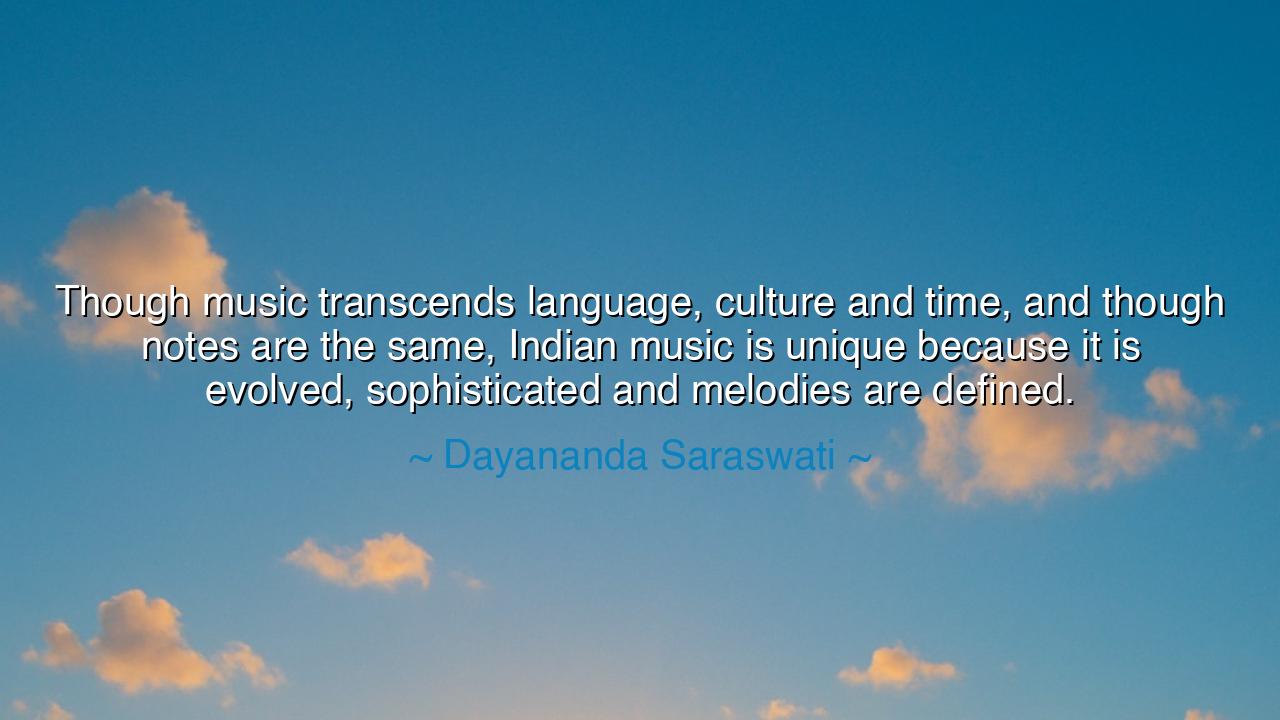
Though music transcends language, culture and time, and though
Though music transcends language, culture and time, and though notes are the same, Indian music is unique because it is evolved, sophisticated and melodies are defined.






“Though music transcends language, culture and time, and though notes are the same, Indian music is unique because it is evolved, sophisticated and melodies are defined.” Thus declared Dayananda Saraswati, a sage who sought to preserve the eternal wisdom of India while guiding her people toward renewal. His words resound like the tones of a sitar in a quiet temple: a reminder that while all music shares a universal language, the traditions of a people give it a soul unlike any other.
The ancients always understood that music was not merely sound, but a reflection of the cosmos. Across lands and ages, men struck drums, plucked strings, and raised their voices to the sky. Yet while the notes may be shared, each culture shaped them according to its spirit. Saraswati, in his reverence, proclaimed that Indian music stands apart—not because it denies the universality of music, but because it refines it with profound sophistication, with a structure that is both mystical and precise. Here, melody is not wandering chaos but a path, defined and disciplined, leading both artist and listener toward transcendence.
Indian music is ancient, born of the Vedas, where sound itself was considered divine. The chants of the Rigveda were not mere hymns, but vibrations meant to harmonize the soul with the eternal order. From this foundation grew the ragas—melodic frameworks each tied to time of day, season, or mood. Unlike much of Western music, which often seeks harmony in chords, the genius of Indian melody lies in its depth and discipline, in the ability to weave infinite variations within a single defined structure. Thus Saraswati names it evolved, for it is not a simple collection of notes, but a living philosophy of sound.
Consider the story of Tansen, the legendary musician of Akbar’s court. It is said that when he sang the raga Deepak, the lamps around him burst into flame. Whether myth or truth, the tale captures the essence of Indian music: not mere performance, but mastery over nature itself. The melodies were so refined, so deeply bound to the order of creation, that they seemed to summon fire, rain, or peace of heart. Tansen’s art was proof that Indian music was not only entertainment—it was a discipline of the soul, a science of vibration, a path to the divine.
The meaning of Saraswati’s words, then, is both cultural and spiritual. Yes, music unites all mankind; yes, the same seven notes sing across continents. But within India’s tradition, those notes are not left unshaped. They are given form through centuries of refinement, through rules of raga and tala, through the patient wisdom of teachers and the devotion of students. This is what makes it unique: it is defined, yet boundless; disciplined, yet filled with freedom; earthly in sound, yet heavenly in aim.
The lesson is mighty. To honor diversity does not mean to deny universality. Just as Indian music reveals its uniqueness while still belonging to the greater family of sound, so too should we seek our own distinct voice while remembering our shared humanity. The world is richer not because every culture is the same, but because each refines the universal into its own jewel. In this way, India’s music teaches us both humility and pride: humility to see we are part of a greater song, pride to see our own melody adds irreplaceable beauty to it.
O seekers of wisdom, take this into your lives. Do not think that to be unique, you must abandon the universal; nor that to honor the universal, you must erase your own voice. Instead, like the ragas, define your melody. Sharpen your craft, evolve your spirit, bring sophistication to your art, and in so doing, contribute to the eternal music of mankind. Let Saraswati’s words echo within you: notes are the same, but uniqueness lies in how you shape them.
Thus the quote endures as a song in itself: music is universal, but Indian music, evolved and defined, reveals the power of discipline joined with beauty. And so too should your life be: grounded in what is shared, yet made radiant by what is uniquely yours.






AAdministratorAdministrator
Welcome, honored guests. Please leave a comment, we will respond soon